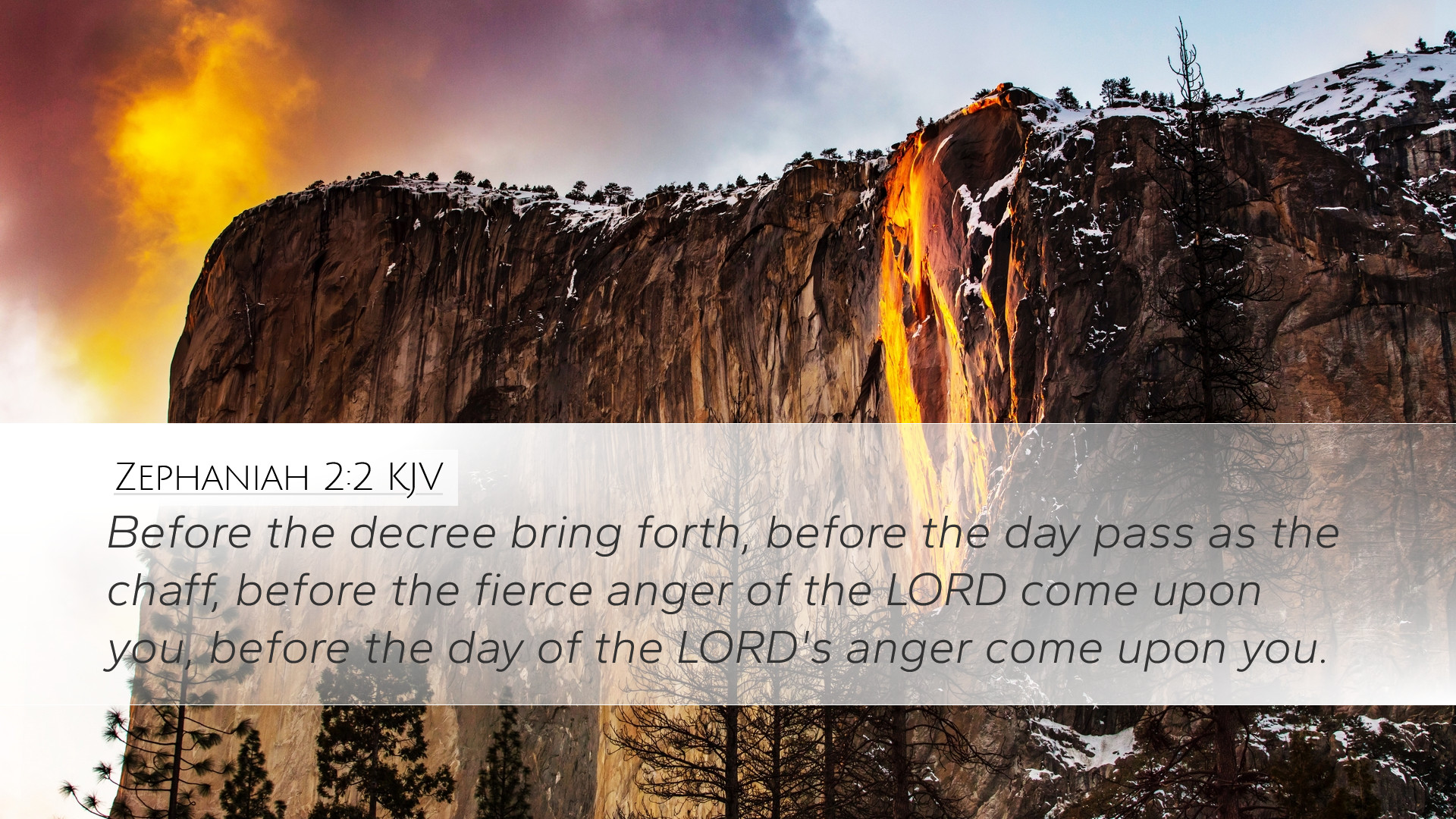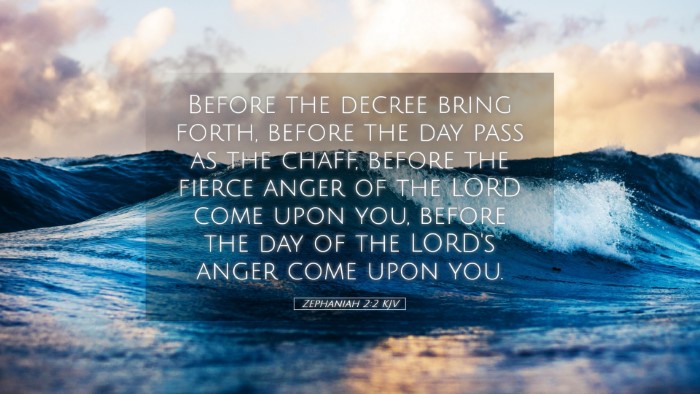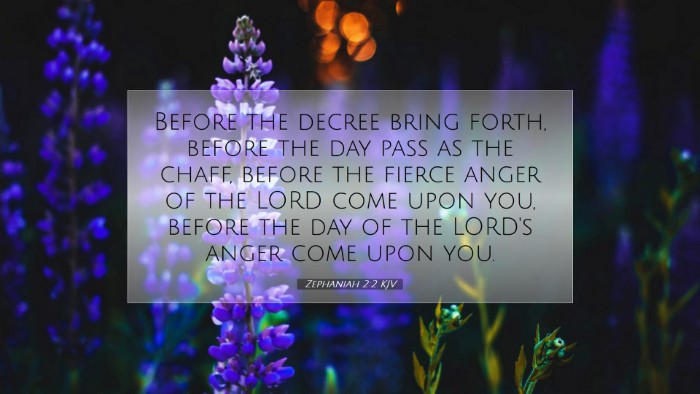Old Testament
Genesis Exodus Leviticus Numbers Deuteronomy Joshua Judges Ruth 1 Samuel 2 Samuel 1 Kings 2 Kings 1 Chronicles 2 Chronicles Ezra Nehemiah Esther Job Psalms Proverbs Ecclesiastes Song of Solomon Isaiah Jeremiah Lamentations Ezekiel Daniel Hosea Joel Amos Obadiah Jonah Micah Nahum Habakkuk Zephaniah Haggai Zechariah MalachiZephaniah 2:2
Zephaniah 2:2 KJV
Before the decree bring forth, before the day pass as the chaff, before the fierce anger of the LORD come upon you, before the day of the LORD's anger come upon you.
Zephaniah 2:2 Bible Commentary
Commentary on Zephaniah 2:2
Text of Zephaniah 2:2 (KJV): "Before the decree bring forth, before the day pass as the chaff, before the fierce anger of the Lord come upon you, before the day of the Lord's anger come upon you."
Introduction
The book of Zephaniah is a profound and compelling prophetic oracle that speaks to the nation of Judah, urging them to repentance and warning them of impending judgment. In this context, Zephaniah 2:2 serves as a critical appeal for timely action in the light of divine wrath. This commentary synthesizes insights from notable public domain scholars to deepen the understanding of this verse, particularly for pastors, students, and theologians.
Understanding the Context
Historical Background: Zephaniah prophesied during the reign of King Josiah (640-609 BC), a time marked by extreme idolatry and moral decay in Judah. The imminent threat of judgment declared in this short book reflects the larger themes of prophetic literature concerning divine justice and mercy.
Thematic Significance: Zephaniah's message revolves around the 'day of the Lord,’ an eschatological theme prominent in the prophetic tradition, encapsulating both divine judgment and restoration.
Verse Analysis
In Zephaniah 2:2, the prophet issues a clarion call to the leaders and people of Judah, urging them to seek the Lord earnestly before it is too late. This verse contains several critical components:
- Urgency of the Situation: The phrase "before the decree bring forth" emphasizes the immediacy of the call to repentance. Matthew Henry notes that this decree is God's determination to bring judgment upon Judah. The people are urged to act before this decree manifests.
- Temporal Nature of Judgment: The imagery of a fleeting day passing "as the chaff" captures the brevity and inevitability of the day of the Lord’s wrath. Albert Barnes elaborates that just as chaff is blown away by the wind, so too will be those who fail to heed the warning.
- Divine Anger: The repetition of "before the fierce anger of the Lord" emphasizes the seriousness of God’s impending judgment. Adam Clarke explains that this anger stems from the sinful nature of humanity and their rebellious actions against God’s commandments.
Theological Implications
This verse prompts significant theological reflection. It illustrates the tension between grace and judgment, underscoring the need for repentance, which is a recurring theme in prophetic literature.
- God’s Patience: The initial exhortation implies that there is still time for repentance. Scholars highlight the tension between God’s justice and His mercy, where His anger is tempered with an opportunity for sinners to return to Him.
- The Nature of True Repentance: True repentance goes beyond mere acknowledgment of sin; it entails turning away from it. As noted by Henry, the people are called to a deeper commitment to seeking the Lord.
- The Day of the Lord: This eschatological theme in Zephaniah invites a broader reflection on the nature of divine judgment throughout Scripture, pointing to the ultimate fulfillment of God’s promises in Christ.
Practical Applications
For contemporary believers, Zephaniah 2:2 offers potent exhortations:
- Timeliness in Faith: The urgency presented by Zephaniah challenges believers to actively pursue God and righteousness without delay. It encourages a proactive faith that seeks to align with God's will.
- Awareness of God's Holiness: Understanding the fierce anger of the Lord fosters a healthy fear of God, a theme echoed throughout Scripture that calls for reverence and accountability in the life of a believer.
- Call to Action for Leaders: Pastors and church leaders are reminded of their responsibility to lead congregations in repentance and to educate them on the implications of spiritual apathy.
Conclusion
Zephaniah 2:2 stands as a timeless reminder of God’s call to repentance before the imminent day of judgment. The prophet’s words resonate throughout the ages, urging not just the people of Judah, but all generations, to seek God earnestly before it is too late. The insights drawn from public domain commentaries serve to enrich our understanding and application of this profound message.


